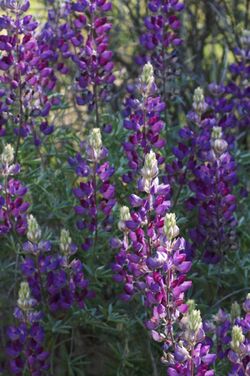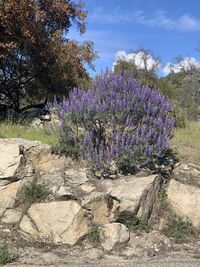Biology:Lupinus albifrons
| Lupinus albifrons | |
|---|---|

| |
| Scientific classification | |
| Kingdom: | Plantae |
| Clade: | Tracheophytes |
| Clade: | Angiosperms |
| Clade: | Eudicots |
| Clade: | Rosids |
| Order: | Fabales |
| Family: | Fabaceae |
| Subfamily: | Faboideae |
| Genus: | Lupinus |
| Species: | L. albifrons
|
| Binomial name | |
| Lupinus albifrons Benth.
| |
Lupinus albifrons, silver lupine, white-leaf bush lupine, or evergreen lupine, is a species of lupine (lupin). It is native to California and Oregon, where it grows along the coast and in dry and open meadows, prairies and forest clearings. It is a member of several plant communities, including coastal sage scrub, chaparral, northern coastal scrub, foothill woodland, and yellow pine forest.
Description
Lupinus albifrons is a perennial shrub, taking up about 2 ft (0.61 m) of space and reaching 5 ft (1.5 m). It has a light blue to violet flower on 3–12 inches (7.6–30.5 cm) stalks. The leaves are silver with a feathery texture.[3] It grows in sandy to rocky places below 5,000 feet (1,500 m).[4]
Cultivation
This plant grows as a wildflower in the hills and valleys of California. It requires good drainage and needs little water once the roots are established.
Toxicity to livestock
The plant is deer-resistant due to the presence of the bitter-tasting alkaloid toxins anagyrine and lupinine.[5] Because of these toxins lupines can negatively affect livestock, causing birth defects and decreasing weight especially in young, inexperienced cattle.[5] When cows are under stress from lactating, especially in times of low forage availability, they will consume more lupine than usual.[5]
Mission blue butterfly
The federally endangered mission blue butterfly requires either Lupinus albifrons, Lupinus formosus and Lupinus variicolor, on which their larvae feed.[6] The butterfly becomes toxic itself when it feeds on the plant, leaving it with a bitter taste to deter predators.
Due to its potential danger to livestock, this lupine is removed from rangeland when possible, eliminating a crucial food plant from the butterfly's range[citation needed].
Infraspecific taxa
Lupinus albifrons has six different varieties, four of which occur only in California, the other two occur in both California and Oregon:[7]
- Lupinus albifrons var. albifrons, silver lupine
- Lupinus albifrons var. collinus, silver lupine
- Lupinus albifrons var. douglasii, Douglas' silver lupine
- Lupinus albifrons var. eminens, silver lupine
- Lupinus albifrons var. flumineus, silver lupine.
- Lupinus albifrons var. hallii, also called Lupinus paynei, Payne's bush lupine. [8]
Photos
See also
- California chaparral and woodlands
- California coastal sage and chaparral ecoregion
References
- ↑ "NatureServe Explorer Lupinus albifrons". NatureServe. 2022-06-03. https://explorer.natureserve.org/Taxon/ELEMENT_GLOBAL.2.128411/Lupinus_albifrons.
- ↑ Faber-Langendoen, D; Nichols, J; Master, L; Snow, K; Tomaino, A; Bittman, R; Hammerson, G; Heidel, B et al. (2012) (PDF). NatureServe Conservation Status Assessments: Methodology for Assigning Ranks (Report). Arlington, Virginia, United States of America: NatureServe. https://www.natureserve.org/sites/default/files/natureserveconservationstatusmethodology_jun12.pdf.
- ↑ "Silver Lupine, Lupinus albifrons". https://calscape.org/Lupinus-albifrons-().
- ↑ "Lady Bird Johnson Wildflower Center - The University of Texas at Austin". https://www.wildflower.org/plants/result.php?id_plant=lual4.
- ↑ 5.0 5.1 5.2 Effects of Experience and Lactation on Lupine Consumption by Cattle
- ↑ Essig Museum of Entomology
- ↑ Plant Profile, Silver Lupine, Natural Resources Conservation Service, U.S. Department of Agriculture
- ↑ https://www.calflora.org/app/taxon?crn=13568
External links
- Jepson Manual Treatment - Lupinus albifrons
- CalFlora - Lupinus albifrons
- Lady Bird Johnson Wildflower Center
- Golden Gate National Recreation Area
- Lupinus albifrons - Photo gallery
Wikidata ☰ Q4118548 entry
 |




